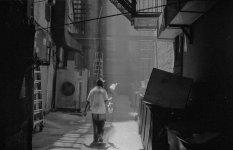John! Any of us can consider ourselves artist, even if we don’t make a penny from our art. I think the main tenant of Steve starting this discussion was trying to narrow the definition of fine art for an article.
Well said, and I fully agree, was just referring to the other part of the argument, a "legal" and perhaps Tax-man definition.
With the interest extant, along with the increase, both in numbers, and quality, of currently available and affordable equipment, it has become less of a question of wrestling with necessarily difficult technology, leading to a lot of very good work done by people who are Amateur, and hopefully subject and image oriented as opposed to mainly a technician.
I think Roger brought up the "law of excluded middle", and there is obviously a degree of both in most people who are serious about capturing good images.
I think the argument can be made that much of the best work is amateur produced, certainly there are many images produced by people searching seriously to find just those types of excellent images.
Would be interesting to see where RFF members would put such a theoretically sliding scale?
Regards, John

